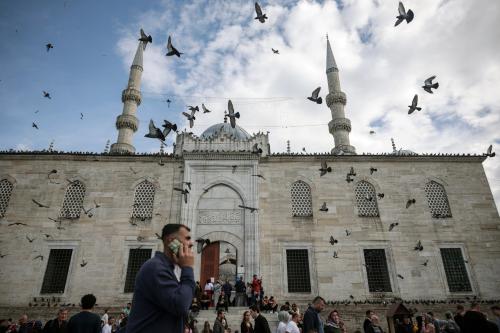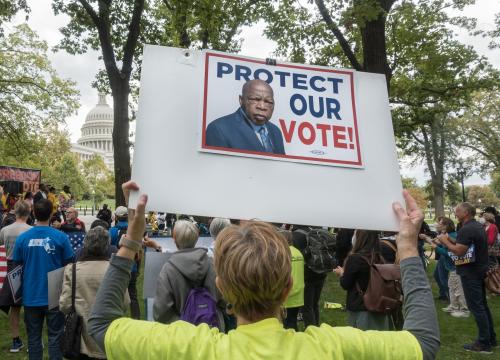Winston Churchill when describing the Soviet Union during the Second World War called it “a riddle wrapped in a mystery inside an enigma.” This description also fits North Korea. Its isolation from the rest of the world coupled with a near absence of human rights and a proclivity toward developing nuclear weapons make it a mysterious and dangerous puzzle.
As a result, there are major difficulties in addressing the North Korean refugee crisis. To begin with, there are disputes over the status of the North Koreans crossing into China, which in turn affects their treatment and the benefits to which they are entitled. The government of China insists they are economic migrants since most are seeking economic opportunity — just like Mexicans, they say, heading into the United States. Human rights and refugee advocates, however, rightly point out that while many North Koreans cross the border for economic reasons, they leave their country at risk of arrest, and if they return or are turned back, most if not all will suffer some form of persecution and punishment. North Koreans who leave their country are therefore deemed by NGOs to be refugees or ‘refugees sur place.’ To UNHCR, the international refugee agency, North Koreans who cross into China are considered “persons of concern” to whom the agency has been trying to gain access in order to determine their status. UNHCR would note that every North Korean who leaves is entitled to South Korean citizenship, which means they might not be in need of international protection as refugees. But the High Commissioner when he visited China in 2006 publicly stated that forcibly repatriating North Koreans without any determination process stands in violation of the Refugee Convention. And UNHCR has been proposing a special humanitarian status for North Koreans in China to increase their protection.
A second difficulty is measuring the scope of the problem. Accurate statistics are hard to come by. The Chinese government says 10,000 North Koreans are in China whereas the State Department says the total is 30-50,000 and some NGOs claim up to 300,000. But the numbers could easily rise. Food shortages and possible famine are being predicted for 2008, which could lead to more outflows into China, as could a medical epidemic or a natural disaster or even severe political repression. But since 2002, China has been cracking down on North Koreans, as well as on the individuals and groups helping them. At present, China is reported to be returning 100 to 300 North Koreans a week, which could be 5,000 to10,000 or more per year.
A third main difficulty in addressing the North Korean refugee situation is that the principal countries that can take in North Koreans want to keep them out or keep their numbers low. China, which takes in the most, especially in times of famine, fears that too many North Koreans could pose an economic strain on its undeveloped border regions, disrupt the demography of the area and put into question whether that part of China is Chinese or Korean in line with historic Korean claims. China also does not want to promote the destabilization of its ally through mass departures. As for South Korea, despite its offer of citizenship to all Northerners who arrive in the south, it is not proactive in promoting the exodus of North Koreans, although it does more than in the past. To date there are only some 10,000 North Koreans in South Korea. For the south, the main concern is that massive refugee outflows from the North would undermine South Korea’s long worked for economic progress and stability. Reunification in its view should come slowly and in a managed way. Policies that provoke internal chaos and massive refugee outflows would carry too high a cost. In fact, both South Korea and China, largely to prevent collapse and potential refugee flows, provide substantial humanitarian and development aid to North Korea.
Some experts argue that aid, investment and engagement with North Korea will open the country up, expose it to new ideas, and in time lead to economic reforms and political evolution that will eliminate the refugee problem. Others, however, counter that the only way to create a democratic government and achieve human rights observance in North Korea is by regime change; and they encourage provoking refugee flows in order to destabilize the regime. With the six party talks and the conclusion of the 2007 nuclear agreement, the engagement strategy has won out. But engagement that is open ended without any conditions linked to political and human rights reform could strengthen the regime; indeed the food and other aid provided in the past is said to have allowed North Korea to devote more of its resources to strengthening the military and political elite that support Kim Jong Il.
It is therefore important to try to integrate human rights and humanitarian issues into the six party talks on North Korea. The talks have created a set of working groups, including on peace and security, in which human rights and humanitarian issues could and should be integrated. After all, commitments not to produce or use nuclear weapons require transparency, access, monitoring, and rule of law to be successful. Similarly, cooperation in developing energy and transportation infrastructure or in bringing in humanitarian aid must address issues of access and equitable food distribution as well as worker standards and corruption issues. Indeed, achieving deeper and more permanent peace and security on the Korean peninsula will require commitment to basic standards of human rights. Similarly, any discussion of normalization of relations between North Korea and the United States should include human rights obligations, in particular the freer movement of people, information and ideas across borders. The ability of North Koreans to freely move around inside their own country in search of food, medicines and jobs or to leave their country in search of these essentials or to seek political asylum must be affirmed as a basic right; it is also a critical survival strategy. Although most attention usually focuses on North Korea’s refugees, it is also important to pay attention to those who try to move within the country so that they and their families can survive. While internal controls are sometimes relaxed, internal displacement in North Korea, unlike in most other countries of the world, is a criminal offense.
The six party talks should include discussion of these issues and also produce a future organization and framework on security and cooperation for Northeast Asia that would allow for regular discussions and review meetings of political, security, economic, humanitarian and human rights issues – including freedom of movement, refugee and asylum issues, and family reunifications. At present, there is no structured dialogue for discussing these issues in depth even though many of them have regional impact affecting other countries. A multilateral framework could draw upon the European and US experience of the Helsinki process with the former Soviet Union and Eastern Europe. The Helsinki Final Act of 1975, signed by 35 countries in Europe, North America and the Soviet bloc in the height of the Cold War, made it possible for countries with totally different systems and motivations to come together and talk about human rights issues, including individual cases. I was in the State Department at the time when the first review meetings were held under the Helsinki Final Act and I saw that progress was made. Moreover, raising human rights issues within a broader framework of economic, political and scientific cooperation gave legitimacy to the human rights part and made it more palatable. Planning for an institution and a framework needs to begin now; refugee and human rights issues in China and North Korea need to become a legitimate part of a broader and systematic framework of discussion and action in Northeast Asia.
Because China’s role is central to dealing with the North Korean refugee crisis, steps should be taken to hold it accountable. Multilateral initiatives can carry more weight than bilateral diplomacy. The United States, together with democratic Asian and European states, therefore, should work at the United Nations to take advantage of the fact that China has ratified many international human rights treaties. The Torture Convention, treaties on discrimination against women, children, and economic and social rights, all of which China has signed onto, apply to non-nationals. Well-documented information on violations specific to refugees should be submitted to these treaty-monitoring bodies. In addition, states and NGOs should make a concerted effort at the Human Rights Council to ensure that the recommendations made by UN rapporteurs with respect to China are implemented and that any overall review of China’s human rights record encompasses their treatment of refugees.
At the UN High Commissioner for Refugees, the US and other states should undertake private multilateral intercessions with China about North Korean refugees, or bring the issue before the Executive Committee. China is a member of Excom, yet its refusal to allow UNHCR access to the border areas and its repatriation of North Koreans violate the Refugee Convention. This is not only undermining the agency and the protections it tries to uphold but also is influencing the attitudes of other countries, particularly in Asia, which are expected to take in refugees and protect them. Taking these steps will also encourage UNHCR staff to become more proactive.
Finally, capacity building in China is important. UNHCR has been holding workshops in China on asylum and refugee law, a significant step. These and additional workshops are needed so that a corps of experts can develop in China with an understanding of the human rights of refugees, of temporary protection, of issues of statelessness — and who can work to influence their own government’s policies. A law school like this could seek to develop dialogues with law schools in China on the refugee issue. The US and other countries could also try to convene meetings to promote the integration of human rights and refugee issues into China’s foreign policy. This is longer term, but Chinese staff at think tanks, institutes, moderates in the party will want to think about the integration of standards in foreign policy as China’s own economic and military relationships expand with other countries, and as China becomes more sensitive to its reputation and aspires to be seen as a responsible member of the international community.
Fall Symposium: “Forgotten Crisis: The Plight of North Korean Refugees”, University of Pennsylvania School of Law
The Brookings Institution is committed to quality, independence, and impact.
We are supported by a diverse array of funders. In line with our values and policies, each Brookings publication represents the sole views of its author(s).



Commentary
Human Rights and the North Korea Refugee Crisis
October 25, 2007